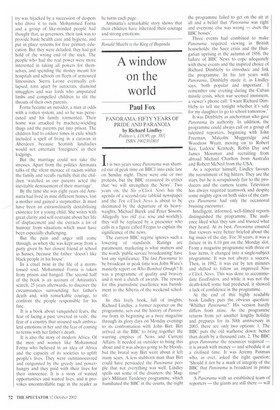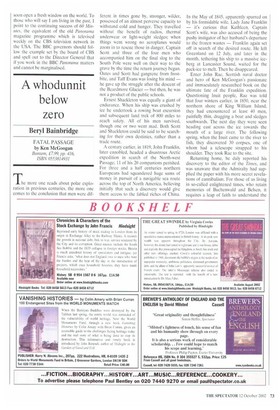A window on the world
Paul Fox
PANORAMA: FIFTY YEARS OF PRIDE AND PARANOIA by Richard Lindley Politico's, £18.99, pp. 383, ISBN 1902301803 It is two years since Panorama was shunted out of peak time on BBC1 into exile late on Sunday night. There were one or two protests, but the BBC reassured its critics that 'we will strengthen the News'. Two years on, the Six o'Clock News has the agenda of a second-rate tabloid newspaper and the Ten o'Clock News is about to be decimated by the departure of its heavyweights, Michael Burck and Peter Sissons. Allegedly 'too old' (i.e. wise and worldly), they will be replaced by a presenter who calls in a figure called Fergus to explain the significance of the news.
The current BBC regime ignores such a lowering of standards. Ratings are paramount, marketing is what matters and the words 'public service broadcasting' have lost any significance. The last Panorama to be broadcast in peak time was John Ware's masterly report on Who Bombed Omagh? It was a programme of quality and bravery and it won a clutch of awards. The reward for this journalistic excellence was banishment to the Siberia of the weekend schedule.
In this lively book, full of insights, Richard Lindley, a former reporter on the programme, sets out the history of Panorama from its beginning as a twee magazine through its glory days on Monday evenings to its confrontation with John Birt. Birt arrived at the BBC to bring together the warring empires of News and Current Affairs. It needed an outsider to bring this about and it was always going to be bloody, but the brutal way Birt went about it left many scars. A less stubborn man than Birt could have persuaded the Panorama people that not everything was well. Lindley spells out some of the disasters: the Maggie's Militant Tendency programme, which humiliated the BBC in the courts, the night
the programme failed to get on the air at all and a belief that 'Panorama was right and everyone else was wrong — even the BBC bosses'.
Three events had combined to make Panorama required viewing in British households: the Suez crisis and the Hungarian uprising in the autumn of 1956, the failure of BBC News to cope adequately with these events and the inspired choice of Richard Dimbleby to introduce and link the programme. In his ten years with Panorama, Dimbleby made it, as Lindley says, 'both popular and important'. I remember one evening during the Cuban missile crisis, when war seemed imminent, a viewer's phone call: 'I want Richard Dimbleby to tell me tonight whether it's safe for my daughter to go to school tomorrow.'
It was Dimbleby as anchorman who gave Panorama its authority. In addition, the programme could always call on a group of talented reporters, beginning with John Freeman, Malcolm Muggeridge and Woodrow Wyatt, moving on to Robert Kee, Ludovic Kennedy, Robin Day and James Mossman and recruiting from abroad Michael Charlton from Australia and Robert McNeil from the USA.
As a reporter himself, Lindley favours the recruitment of big hitters. They are the stars, but he is scrupulously fair to the producers and the camera teams. Television has always required teamwork and despite some mighty egos on both sides of the camera Panorama had only the occasional bruising encounter.
Intelligent, informed, well-filmed reports distinguished the programme. The audience liked what they saw and trusted what they heard. At its best, Panorama ensured that viewers were better briefed about the big issues of the day. For 30 years, it was a fixture in its 8.10 pm on the Monday slot. From a magazine programme with three or four items, it changed into a single-subject programme. It was not always a success. Then, in 1982, it was cut by ten minutes and shifted to follow an improved Nine o'Clock News. This was done to accommodate EastEnders, and while it was not the death-knell some had predicted, it showed a lack of confidence in the programme.
At the end of this highly readable book Lindley puts the obvious question: 'Whither Panorama?' His version hardly differs from mine. As the programme returns from yet another lengthy holiday and prepares for its 50th anniversary in 2003, there are only two options: 1. The BBC puts the old warhorse down: better than death by a thousand cuts. 2. The BBC gives Panorama the resources required — it is awash with money — and schedule it at a civilised time. It was Jeremy Paxman who, as ever, asked the right question: 'Should it not be a mark of integrity of the BBC that Panorama is broadcast in prime time?'
A Panorama with an established team of reporters — the giants are still there — will soon open a fresh window on the world. To those who will say I am living in the past. I point to the continuing success of 60 Minutes, the equivalent of the old Panorama magazine programme which is televised weekly on the CBS television network in the USA. The BBC governors should follow the example set by the board of CBS and spell out to the Director General that if you work in the BBC Panorama matters and cannot be marginalised.



































































































 Previous page
Previous page